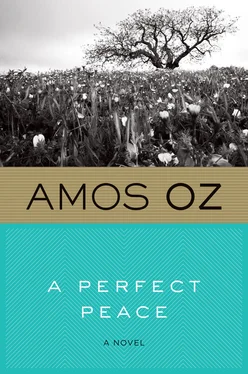I say "the battle" — yet as soon as I say it, I sense, staring down at me through the thin curtain of ideology, the savage peaks of a suffering far more primeval. The very suffering that drives all of us to look constantly for battlefields, for "challenges," to fight, to defeat, to win. How shall we tame the ancient instinct to seize, in Rimona's words, a spear or a sword and run after an antelope and stalk it, hunt it, kill it, and then celebrate the killing? What can we do against the weariness of heart, the subtle, cunning cruelty which is not openly sadistic and can even masquerade as the most reasonable and "constructive" of behaviors? What shall we say in the face of the secret brutishness lurking within each of us, what our forefathers called the uncircumcised heart and what even a logical-minded, self-disciplined, monkish, musical village priest like myself sometimes discovers in his own soul? With what weapon can we repel this interior wilderness? How can we overcome our dark desires to dominate others, to humiliate them, to subjugate them, to make them dependent on us, to chain and enslave them with the gossamer threads of guilt, shame, and even gratitude?
I have just reread my last few lines. "With what weapon can we repel?" "How can we overcome?" Even as I seek to avoid the horror, the horror is infecting my own way of speaking. To repel. To overcome.
I am seized by fear and trembling.
The mountains and the desert say nothing. The very earth is dumb. The sea booms, but it booms indistinctly. The sky burns by day and freezes by night. Winter follows summer and summer succeeds winter. People are born and die, and slowly all things disintegrate. Our surroundings. Our thoughts. My hand that writes. This pen, this paper, this desk. All our beliefs and convictions. Families. Everything is consumed by the cancer of time. Decomposed like the notes of my flute in this lonely room at night — sounding forth, dispersing, then gone. All things entropize. Everything unravels. Even as they persist they are on their way to nonbeing. The strongest emotions. Words. Stone buildings. Fortified cities. Whole nations. Perhaps the stars above as well. Time devours all. And yet all the while human wisdom goes on trying to distinguish the good from the bad, the true from the false, though it too must crumble before the onslaught, which grinds to smithereens the good, bad, right, wrong, beautiful, ugly labels that we seek to pin on things.
When I keel over one morning and die alone like a bug on the floor of this room, the slate will be wiped clean. A note was heard but it is heard no more. To quote Bolognesi, Bless'a the name of the Lord Who grant'a a perfect peace. But there is no perfect peace. Time that takes us apart will take away all traces of us. As the waters cover the sea. Would it have been any different had I been loved by a woman? Had I had children and grandchildren? The waters would have covered the sea just the same. I am seized by fear and trembling.
What exactly is it, then, that has been happening to me? All of a sudden, on the brink of old age, I have begun to crave a smidgeon of power and honor. Not only to crave them, but to get them, absurd as that may sound. Why, what better example could there be than Yolek, a man sated with honor and power. How I have envied him all my life, how I have longed to be a witness to his downfall, suffering, anguish, even death, so I could take his place. Why, though? To be loved? But Yolek was not loved. Eshkol is not loved. Who is? And Bialik, in one of his poems, asks what love is. Well, just for the record let me answer.
My dear poet, you'll have to forgive me, but I don't know either. It's a rumor. A fleeting shadow. A will-o'-the-wisp. Is this what Yoni went to look for God-knows-where? What Azariah came here to seek? Is there such a thing at all? I can't help smiling as I write this — a man of my age and position mewling like a schoolboy about whether love exists. And yet I insist on asking, does it or does it not? And if it does, how can it possibly when all other things contradict it?
I could take, for example, any father and son. Or any two brothers. Or any husband and wife. All of them, like carriers of the same mysterious virus, harboring their own particular loneliness, their own particular estrangement, their own particular pain, and their own dark desires to inflict such pain on others. Or if not to inflict pain, to use others. To change them. To mold them. To dominate them. To reshape whomever they most love like a lump of putty in their hands. As the waters cover the sea. If I had a son or daughter of my own — a Rimona, say, or a Yoni or Azariah — then would not the cruel inner tyrant in me be brought out too, like a monstrous shadow emerging from the darkness to knead, crush, and reform that child in its own image or that of its most secret desires? Had I dared when I was young to tell P. I loved her, and had she agreed to be mine, wouldn't a Fifty Years' War have broken out on the spot? The Gorgon and the Basilisk? Who will subdue whom? Who will bend whom to his will? And even assuming that such a hideous struggle had taken on the subtlest, most genteel form possible, without claws, without blows, without even a raised voice, would that have been any comfort? How would that have helped to rid us of the pain? For that matter, what can a man of modest ambition do by himself to mitigate the pain, even in his own immediate circle?
Having spent my whole life in sterile observation of what goes on outside my window, I know that in the end there's no way, that pain inheres too deeply in the nature of things, that we are attracted to it like moths to a flame in whatever good or bad we do, and that implicit in all our carnal appetites, in our most private sexual fantasies, in our philosophies, in our parental roles, in our friendships, in our creativity, even in our declared intention of ministering to the suffering around us, is the secret wish to inflict yet more pain as well as to suffer it. What an infernal verse in Genesis: "Sin lieth at the door, and unto thee shall be his desire, and thou shalt rule over him." Perhaps it means:
To take pain.
To inflict it.
To pity.
To inflict yet more to pity more.
To do so to another and to self.
Unto pain shall be thy desire, and thou shalt rule over it.
Rule over? Horribly enough, the monstrous shadow is already ensconced in the very heart of this nobly sensible commandment, tainted as it is by the exhortation to rule. What does that mean, to rule? What, if not to suppress? To put down. To crush. And then to pity and set free, as it were, so as to crush again more subtly. To rule? Over pain? While pain itself is the rule?
What a farce it all is. What a crude joke is being played on us. So banal and vulgar, so repetitious.
What is that saying Azariah is so fond of? "Only the man who has gone down to defeat knows that the taste of triumph is sweet." Defeat? Triumph? No, thank you. All I ask is to know how the pain can be lessened, even if slightly, even if for a time. Through solitude? Asceticism? Language? Or, on the contrary, through mindless ecstasy, sensual riot, turning a deaf ear to everything but the clamor of the blood? How dearly I would like to know the answer.
Matthews calls this "purposeless navigation," not because, in his opinion, it has no biological value, but because its function is simply not known to us.
And Yolek was also right. As always. This impossibly self-indulgent man saw right away that the bizarre, suspicious-looking, hysterically garrulous boy who turned up here one winter night had something special about him that needed to be cultivated, that he might accomplish great things one day and even prove a blessing to us all. Only how did Yolek detect it? Honesty compels me to admit that had it been up to me, and had I been secretary at the time, I would probably have sent Azariah right back out into the night, whether out of caution, narrow-mindedness, the inner equivalent of a shrug, or just a simple disinclination to stick my neck out.
Читать дальше












